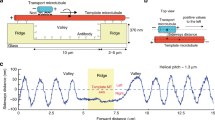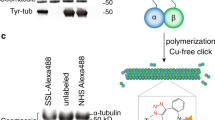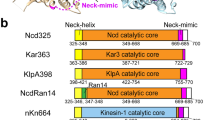Abstract
STUDIES of immobilized kinesin have shown that a single dimeric molecule can maintain contact with and drive sliding of a microtubule1,2. In solution, however, native kinesin binds micro-tubules too weakly3 and hydrolyses ATP too slowly to produce the high sliding velocities seen in motility assays4. This apparent inhibition in solution appears to be caused by the binding of kines-in's tail domains to its motor (head) domains in a folded conformation5. DKH392, a construct containing two heads but no tails, has been shown to display both tight binding to microtubules and high ATPase rates6. Furthermore, it retains one molecule of ADP per dimer when bound to microtubules7, which could facilitate a 'hand-over-hand' mechanism for processive motion. Here we show that DKH392 hydrolyses more than 100 ATP molecules per diffusional encounter with a microtubule, even in the high-salt conditions encountered physiologically. This provides direct evidence that kinesin's activity is highly processive, with the motor remaining attached to a microtubule through many cycles of ATP hydrolysis.
This is a preview of subscription content, access via your institution
Access options
Subscribe to this journal
Receive 51 print issues and online access
$199.00 per year
only $3.90 per issue
Buy this article
- Purchase on Springer Link
- Instant access to full article PDF
Prices may be subject to local taxes which are calculated during checkout
Similar content being viewed by others

References
Howard, J., Hudspeth, A. J. & Vale, R. D. Nature 342, 154–158 (1989).
Block, S. M., Goldstein, L. S. B. & Schnapp, B. J. Nature 348, 348–352 (1990).
Vale, R. D., Reese, T. S. & Sheetz, M. P. Cell 42, 39–50 (1985).
Huang, T.-G. & Hackney, D. D. J. biol. Chem. 269, 16493–16501 (1994).
Hackney, D. D., Levitt, J. D. & Suhan, J. J. biol. Chem. 267, 8696–8701 (1992).
Hackney, D. D. J. biol. Chem. 269, 16508–16511 (1994).
Hackney, D. D. Proc. natn. Acad. Sci. U.S.A. 91, 6865–6869 (1994).
Hackney, D. D. Proc. natn. Acad. Sci. U.S.A. 85, 6314–6318 (1988).
Hackney, D. D., Malik, A. & Wright, K. W. J. biol. Chem. 264, 15943–15948 (1989).
Sadhu, A. & Taylor, E. W. J. biol. Chem. 267, 11352–11359 (1992).
Hackney, D. D. Biophys. J. 68, s267–s270 (1995).
Gilbert, S. P., Webb, M. R., Brune, M. & Johnson, K. A. Nature 373, 671–676 (1995).
Hackney, D. D. & Nagy, J. M. Biophys. J. 68, a286 (1995).
Svoboda, K., Schmidt, C. F., Schnapp, B. J. & Block, S. M. Nature 365, 721–727 (1993).
Huang, T.-G., Suhan, J. & Hackney, D. D. J. biol. Chem. 269, 16502–16507 (1994).
Author information
Authors and Affiliations
Rights and permissions
About this article
Cite this article
Hackney, D. Highly processive microtubule-stimulated ATP hydrolysis by dimeric kinesin head domains. Nature 377, 448–450 (1995). https://doi.org/10.1038/377448a0
Received:
Accepted:
Issue Date:
DOI: https://doi.org/10.1038/377448a0
This article is cited by
-
Synergy between Cyclase-associated protein and Cofilin accelerates actin filament depolymerization by two orders of magnitude
Nature Communications (2019)
-
Bidirectional motility of kinesin-5 motor proteins: structural determinants, cumulative functions and physiological roles
Cellular and Molecular Life Sciences (2018)
-
Design principles governing chemomechanical coupling of kinesin
Scientific Reports (2017)
-
Engineered kinesin motor proteins amenable to small-molecule inhibition
Nature Communications (2016)
-
Kinesin Motor Enzymology: Chemistry, Structure, and Physics of Nanoscale Molecular Machines
Biophysical Reviews (2015)
Comments
By submitting a comment you agree to abide by our Terms and Community Guidelines. If you find something abusive or that does not comply with our terms or guidelines please flag it as inappropriate.


